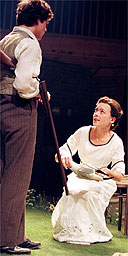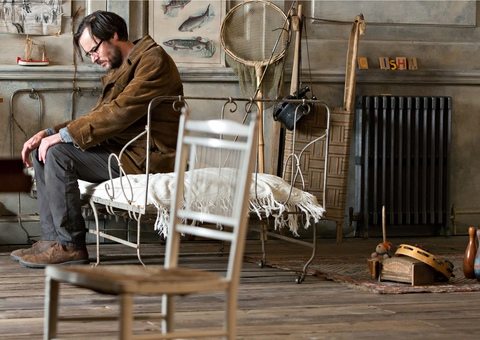It’s over a decade since Katie Mitchell’s groundbreaking production of Martin Crimp’s version of The Seagull at the National Theatre. At the time, the production was vilified by some for its European influences and precisely articulated naturalism, and for releasing the play from the 19th century. But its long-term influence on a subsequent generation of theatremakers staging Chekhov has been clear to see – and welcome. Chekhov’s plays have increasingly been stripped of the birch trees and given an invigorating, contemporary edge. Audiences might seem pre-programmed to kick and scream against these reimaginings of the classics, but the plays prove remarkably robust. Productions such as Benedict Andrews’ Three Sisters at the Young Vic and Sean Holmes’ recent staging of Simon Stephens’ version of The Seagull at the Lyric Hammersmith have been revelatory.
At Cardiff’s Sherman theatre, in one of the best productions of the year so far, Gary Owen and Rachel O’ Riordan transplanted The Cherry Orchard from a Russia trembling on the brink of revolution to Pembrokeshire in 1982 as Thatcherism ushered in an era of social change, the effects of which are still being felt today. It felt very much like Owen, but no less like Chekhov.
If the anniversary of the Russian revolution offers one reason for the current glut of Chekhov revivals, the other may well be the way the plays speak so directly to a world in flux, where the characters cannot comprehend or adjust to the cultural, social and political earthquakes that engulf them. In a great production, we cannot help but see ourselves in the characters.
In The Cherry Orchard Ranevskaya and her family are dodos on the verge of extinction, trying to continue to behave as they did when they were serf-owning land-owners. Ranevskaya shudders at the thought of having holiday cottages on her land leased to accommodate those living in the expanding industrial towns nearby. She would prefer to lose the entire estate rather than try to change and live in the new world ushered in by the century of revolution.
Vanya too clings to the past, beguiled by the image of the man he thinks he might have been rather than facing up to the relic he has become. He knows he must change; he just has no idea how to go about it. As Raymond Williams once observed of Chekhov’s characters: “It is the sensibility of a generation which sits up all night talking about the need for revolution, and is then too tired next morning to do anything at all, even about its own immediate problems.” In the age of social media, that sounds familiar.
The tired old trappings of samovars and people staring into the middle distance looking very, very glum have given way to new Chekhovian conventions: the current one is peeling wallpaper. The house in Nottingham Playhouse’s revival of The Cherry Orchard, directed by outgoing artistic director Giles Croft, looks barely habitable. Meanwhile, at Home in Manchester, Walter Meierjohann is directing Andrew Upton’s version of Uncle Vanya, first produced by the Sydney Theatre Company in 2010 with Cate Blanchett. It features a room with a case of rising damp – and the same could be said for this sitcom-ish evening, which has prominent elements of the farcical as the men hop about with their trousers around their ankles. Astrov (Jason Merrells) is less radical visionary than drunken mooner and Vanya (Nick Holder) is a leering clown for whom it’s hard to shed any tears.
Designer Steffi Wurster’s pared-back aesthetic is strong, while Marc Tritschler’s score and Melanie Wilson’s sound design create a ghostly aural underpinning – and suggest a serious plumbing problem in the estate house. The show is good on the pain of those – particularly Katie West’s Sonya – who are overlooked and doomed to pass through life unseen and unloved. Within the confines of the direction, the performances are vivid. But in stripping almost everyone of any dignity (Hara Yannas’ Yelena performs unsuccessful fellatio on her husband), the production also strips them of sympathy. You just don’t care.
Like so many modern Chekhov productions, this Vanya aims for a timeless quality, with costumes hinting that the play is set now but maybe also then, here but also there. It’s so much the case with Nottingham’s Cherry Orchard that, when Robin Kingsland’s Gayev announces he had a good 70s, it’s not entirely clear whether he means the 1870s or a century later.
Croft’s production, marking the end of his 18-year tenure at the Playhouse, looks both backwards and forwards. Many of the actors featured have worked with Croft over the years. Rather delightfully, the Playhouse’s long-time panto dame, Kenneth Alan Taylor, plays Firs, a man from a previous era who is left behind, dying and forgotten in the crumbling locked-up house.
Simon Stephens’ superbly pointed, compacted version, first directed by Katie Mitchell at the Young Vic in 2014, is put to good use, but whereas that production focused on the way that grief can paralyse people (something the Owen/O’Riordan production examines too), this one looks to the future and how clinging to what we know can thwart new growth. This is in many ways a traditional staging until the final moments, when Tim Meacock’s design really comes into its own and the entire set starts to be dismantled, destroying all illusions. As the sound of axe on wood is heard and the stage is cleared, the entire production becomes both a farewell from Croft and his own act of generosity, in recognising that sometimes the past must be let go in order to make the future.
- Uncle Vanya is at Home, Manchester, until 25 November. Box office: 0161-200 1500. The Cherry Orchard is at Nottingham Playhouse until 18 November. Box office: 0115-941 9419.









